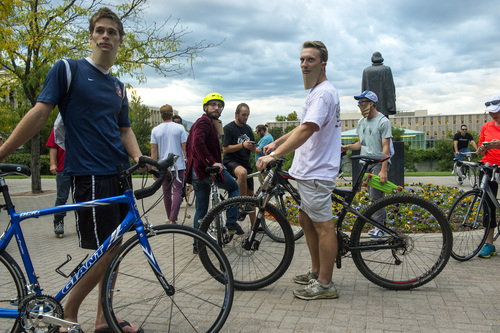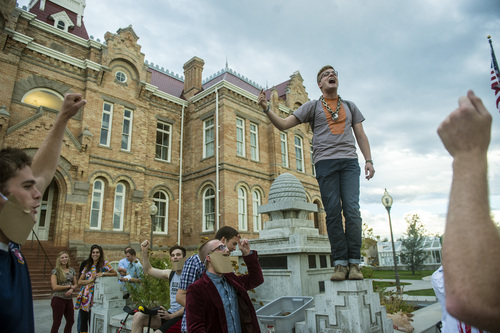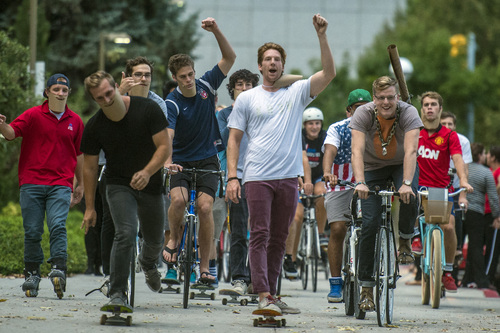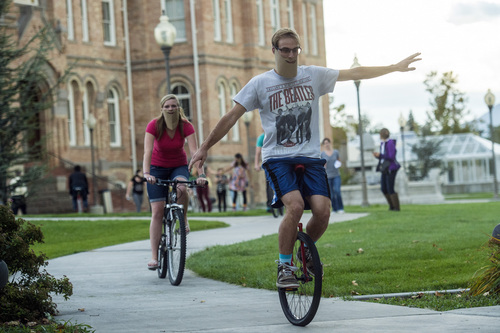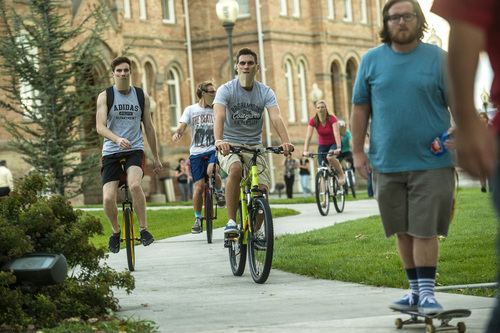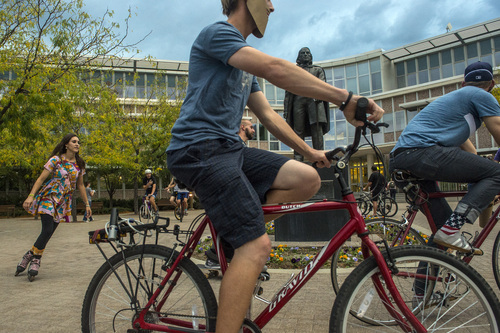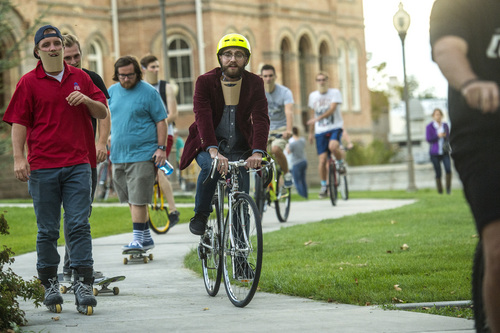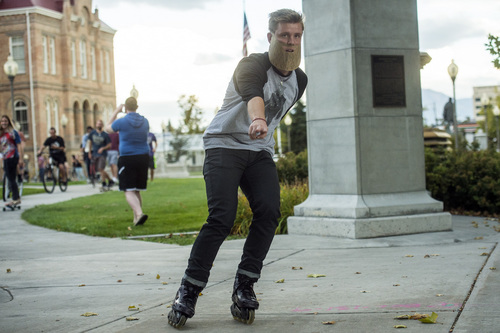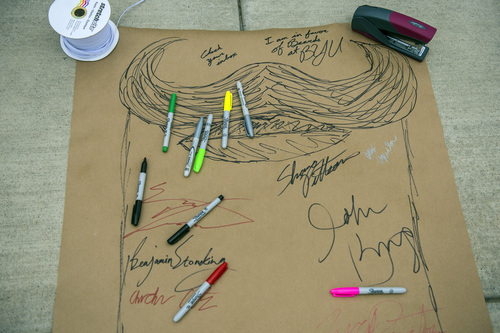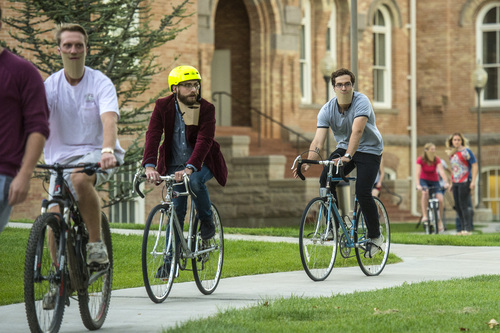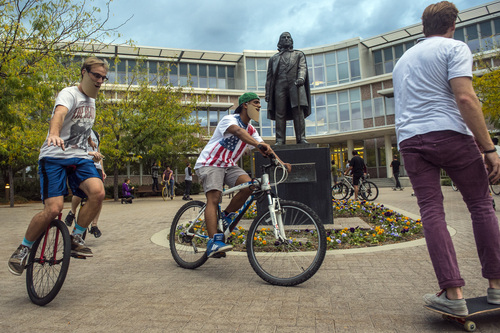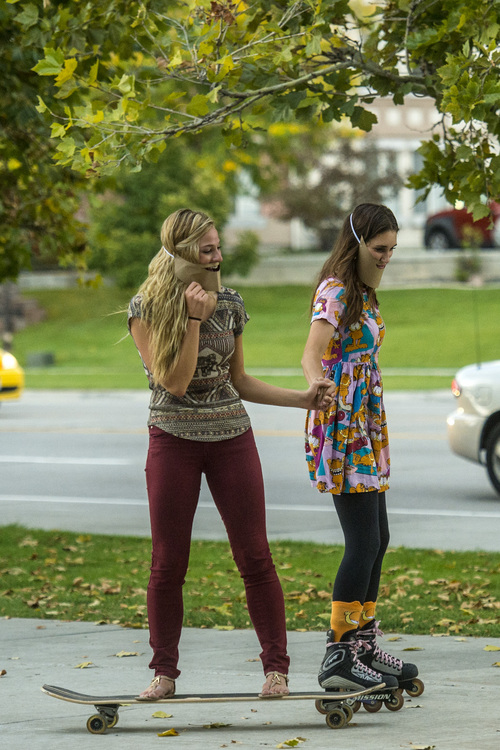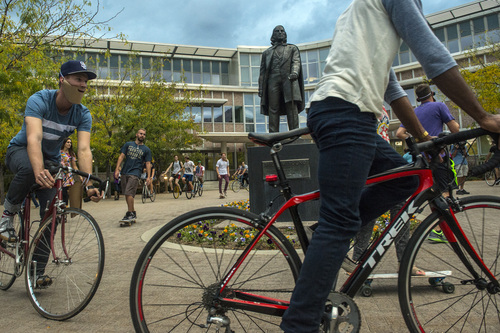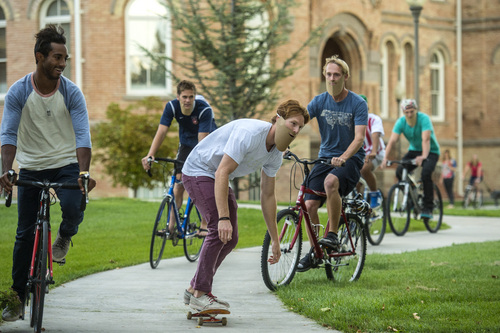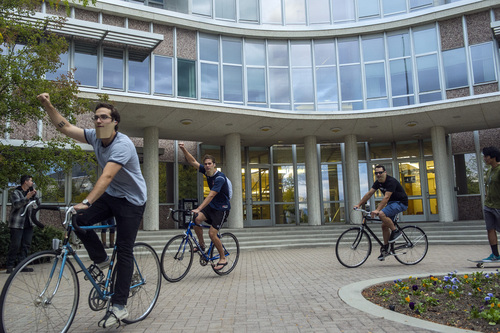This is an archived article that was published on sltrib.com in 2014, and information in the article may be outdated. It is provided only for personal research purposes and may not be reprinted.
About 50 Brigham Young University students on bikes, unicycles and roller blades circled a campus statue of the clean-shaven Mormon leader for whom their school is named Friday evening.
"Bike for beards!" they chanted, some wearing cardboard versions fastened with elastic, others sporting real tufts. The group of mostly men unraveled a petition asking the school to rethink its no-fuzz policy.
Junior Shane Pittson, a 23-year-old international relations major, said he considered organizing such an event for a few years but finally decided a few days ago to make a website and plan a rally.
"I love BYU, I love being a student here," he said, "but the rule on beards I find particularly outdated."
Not every student agrees. One classmate found him posting fliers in the student center, asked for a few copies and shredded them in Pittson's face.
"He looked at me and was like, 'If you don't like the honor code, then you don't have to go here,' " Pittson said.
Pittson's preferred accessory is forbidden under BYU's mandatory student contract, which forbids premarital sex, drinking alcohol and tattoos, among other things. He praises most parts of the honor code for binding students who sometimes felt like outsiders in their hometowns because they didn't experiment with drugs, drinking or sex.
Still, such an effort has had little success. When a student representative in recent years tried to survey classmates about nixing the rule, the questionnaire was taken down from the school's site. Officials said it did not go through the necessary approval process.
University spokeswoman Carri Jenkins noted that students agree to the grooming standards before their first day of class.
"It's nothing against beards," she said of the policy. "It's just how we choose to represent ourselves at the university."
Dozens of images of LDS leaders from the 19th and 20th centuries depict them with long beards, which they urged members to grow as a sign of virility and power. Until 1951, each church prophet sported a beard, save for founder Joseph Smith.
That changed in the 1960s, when beards came to symbolize sexual and political revolution. The ban also reached the church's worldwide missionary force in following years.
A statue in downtown Salt Lake City depicts Brigham Young, the Mormon faith's successor to Joseph Smith, with a healthy beard, but another on the school's campus shows him clean-shaven.
In 1971, then-university President Dallin Oaks defended the bare face rule as "contemporary and pragmatic," saying he would be surprised if the rule was not changed down the road.
At the time, beards and long hair on men were elements of "slovenly appearance" linked to "protest, revolution and rebellion against authority. They are also symbols of hippie and drug culture," or indefference at best, Oaks said.
Pittson and his friends contend that link has broken as lawyers, bankers and businessmen from Williamsburg to Portland bear hair over their chins.
Their female counterparts are forbidden from "sleeveless, strapless, backless or revealing" or form-fitting clothing, as well as any with slits or hems above the knee.
The university's Rexburg, Idaho, campus is even stricter in student dress standards: In 2011, it barred skinny jeans. Shorts and flipflops are out of the question, too.
Off campus, the church bars temple workers and church leaders from sporting any scruff, but members are free to do so.
"It is ironic that temple workers are expected to be more clean-shaven" than God and Jesus as they are portrayed in LDS films and portraits, LDS sociologist Armand Mauss told The Salt Lake Tribune last year.
LDS men are known for wearing dark suits, white shirts and staying clean-shaven.
But Provo has a vintage style all its own. At the school, "these guys that are slightly more progressive will grow big funky mustaches," said Pittson, who is also co-founder of a fledgling nutrition bar company. "But I'm like, what am I doing? I look a lot better with the beard."
The ban provides a bit of flexibility: Students can earn a beard waiver if they're acting in a movie or have a medical condition such as scarring. But others who forgo shaving for a day or sport a dark 5 o'clock shadow recount being turned away from exams and workout facilities.
Sophomore psychology major Brian Fuller said showed up at the rally wearing stubble after urging from his anthropology teaching assistant, who is a woman.
"I'm all for it," he said of the protest, adding that he saw the campus ban on caffeinated drinks as equally unnecessary.
"I feel like everyone feels that way, but they don't feel like they have a place to say anything," he said.
Pittson enjoyed growing his own beard this summer, but is free of facial hair now and shaved before the protest.
"I figured it would make more of an impact to say, I respect the university and here I am abiding by the rules," he said, "but asking for change."
Follow Annie Knox @anniebknox.


